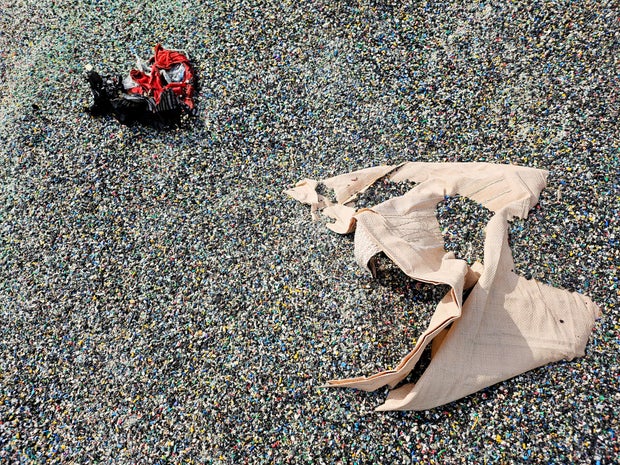Can countries agree to “end the world’s plastic pollution problem”?

Delegates from 175 countries gathered this week in Busan, South Korea, in an effort to negotiate a legally binding agreement to tackle global plastic pollution. The meeting marks the fifth and final phase of the multi-year negotiations of the United Nations’ Intergovernmental Negotiating Committee on Plastic Pollution (INC-5), with a decision on the agreement expected when the conference ends on Sunday.
“We have a historic moment to end the problem of plastic pollution in the world and protect our environment, our health and our future,” said Inger Andersen, the executive director of the UN Environment Programme, told the attendees at the beginning of this week’s talks, which he called. “moment of truth” for messengers, and the planet.
The talks have been marred by a wide gap in views between delegates from smaller, often developing countries, and more advanced economies – and some of the world’s biggest companies are, themselves, at odds.
The non-profit Center for International Environmental Law said Wednesday that INC-5 oil and chemical industry lobbyists collectively form the largest group yet. The 220 registered corporate lawyers at the conference are more than all the delegates representing the countries of the European Union put together.
“Their strategy is designed to protect the financial interests of countries and companies that put their fossil fuel profits above people’s lives, human rights and the future of the world,” said Delphine Levi Alvares, CIEL’s petrochemicals campaign manager.
What is the goal of INC-5?
The purpose of this conference is to finalize a legally binding agreement to reduce the amount of plastic pollution entering the environment and to deal with the scourge of waste. to close the world’s rivers and landfills and pollute everything from the food and water we eat to our veins.
Reuters/Eloisa Lopez
INC-5 delegates were tasked with defining reduction goals, determining how to control hazardous waste and chemicals and defining how to manage the entire life cycle of plastics, from production to disposal.
If they come to an agreement and ratify the new agreement, it will be adopted on Sunday and there will be future meetings of the group to ensure that the signatories are in compliance.
What is at stake?
There is little argument that something should be done to tackle plastic pollution, but how to do it is still being debated.
One of the solutions that was discussed this week was a possible barrier to the production of plastic, but this idea has proven to be very unpopular among nations whose economies are still heavily dependent on the production of plastics and fossil fuels, which are important for making plastic, including China, Russia. , Saudi Arabia and the United States.
Another topic under discussion is the banning of certain chemicals used in some plastics that are known to be toxic to the environment and harmful to human health. There is historical precedent for such focused bans, including the decades-old Montreal Protocol, which saw the production of ozone-depleting chemicals including chlorofluorocarbons (CFCs) banned worldwide.
Island nations and developing countries – as is the case with climate change – are among those most affected by plastic pollution, but are least responsible for producing waste.
Some of these countries say that an agreement on plastic pollution is essential to preserve the fragile environment and public health.
Speaking on behalf of a group of small island developed countries at the talks, Penivao Moealofa, from the small Pacific island nation of Tuvalu, said “it is already a challenge to manage our plastic waste, and it is unfair for us to continue to do so.” managing others’ plastic waste, especially when we contribute less than 1.3% of the world’s total plastic waste.”
If policies are acted upon to change things, the Organization for Economic Cooperation and Development says “annual plastic production, consumption and waste generation is expected to increase by 70% by 2040 compared to 2020,” when the world emits an estimated 480 million tons. . new plastic products.
Reuters/Joyce Lee
Where do different countries stand on plastic pollution?
A group of 68 countries or organizations, including Canada, the EU, Mexico and Australia, is known as the High Ambition Coalition (HAC). Their leaders have supported the goal of stopping all new plastic pollution from entering the environment by 2040, and believe that countries that produce the most plastics, including the US, should pay to transform the global economy away from reliance on new plastics.
In the INC-5 joint statement, HAC highlighted the importance of creating global regulations to ensure that products are designed with circularity in mind. Circularity is the sustainability concept of reusing and remaking products, instead of using them and throwing them away, to reduce the amount of waste.
The petrochemical industry has broadly supported the deal, but strongly opposes production limits and would prefer to rely on other solutions, such as recycling. But as CBS News previously reportedrecycling most plastics is incredibly challenging, expensive, and has not been scaled up anywhere near the level that would make it an effective solution to the problem.
Scientists have suggested that, given the speed at which new plastic products are produced, recycling will not be enough to combat its impact, and reduced production should be a priority.
In August, Reuters reported on the US government’s policy shift in support of a global agreement to reduce plastic production, but three months later, the non-profit news website Grist reported that the Biden administration was backing away from that support ahead of INC-5.
The US State Department has called for an agreement that works to “eliminate plastic pollution entering the environment by 2040,” but US policy relies heavily on recycling and recycling as the main means of achieving the goal – solutions supported by the petroleum and chemical industries.
Another concern for many guests in Busan this week is the American delegation sent by the soon-to-be-departed Biden administration. There are concerns that any commitments Washington makes could be abandoned by the incoming Trump team.
Source link





